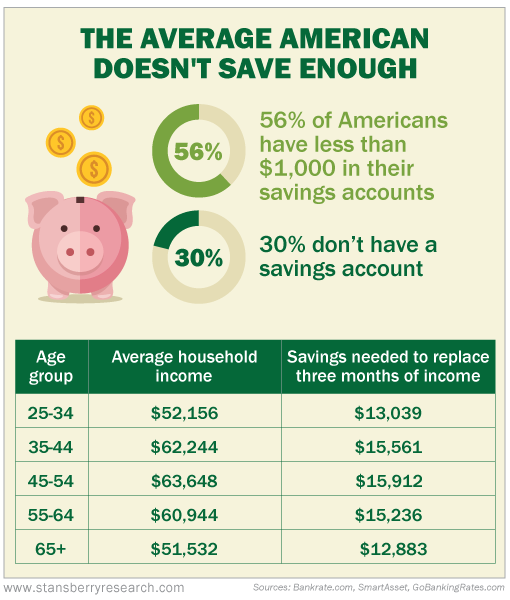If you got a $10,000 raise for the year, what would you do with it?
You might think that you'd only spend some of it. And you'd definitely save most of it.
The frank answer is that you'd spend every dollar.
We inflate our lifestyles to match our income. Look at star athletes who earn more in just one year than most of us make in a lifetime. Many of them make that kind of money for 10 years and still go broke after retiring from sports. Most people do the same thing, on a more mundane scale. It's a great way to go broke, instead of creating a stress-free retirement.
The first step is to curb your spending. Outside of a few things, spending rarely brings joy. Identify the things you truly enjoy spending money on and forget the rest.
Unfortunately, Americans aren't doing that...
Humans are notoriously terrible at predicting what will make them happy. "We expect the next car, the next house, or the next promotion to make us happy even though the last ones didn't and even though others keep telling us that the next ones won't," Harvard psychologist Dan Gilbert explains in his book Stumbling on Happiness. He goes on to say...
We overestimate how happy we will be on our birthdays, we underestimate how happy we will be on Monday mornings, and we make these mundane, but erroneous predictions again and again, despite their regular disconfirmation.
Nowhere does this happen more than when we consider what to spend our money on. We get a nice warm feeling when we buy a new television or pair of shoes. So we tend to search that feeling out. Retailers and advertisers have become adept at targeting it.
But it's short-lived. The thrill of these things wears off quickly. The possessions don't change our lives in any way.
But saving money and using it to increase your personal financial freedom does make lasting improvements to your well-being and quality of life. As you'll see, money saved generates future income. Income is what sets you free. And freedom is what truly makes us happy.
Worse, many people do the exact opposite of saving. They spend money they don't have in pursuit of some unachievable happiness.
Folks in America like to "keep up with the Joneses." The problem is, the Joneses are financially irresponsible. They've got too much house, leased luxury cars, and credit-card debt. If you try and keep up, you'll get dragged down as well. A study conducted earlier this year showed that 49% of Americans, even many with high incomes, wouldn't be able to come up with $400 in cash to fund an emergency.
When you see someone who seems to live too well for the job he has, he doesn't have a secret skill. He often has a secret pile of debt.
But you don't have to become a monk. One benefit of wealth is having money to spend on a few things that bring you joy. For me, I don't hold back when spending on books or travel. It's different for each person.
A good rule of thumb is to choose one or two things you truly enjoy spending money on. Then, cut back to just the basics on everything else.
For example, I drove the same old Hyundai for nearly 15 years. It served me well and I didn't have to make payments on it. Instead of laying out money for a new BMW that wouldn't have made me happier... I decided to spend that money treating myself to a couple of really nice dinners each month.
When you learn to stop buying things that don't make you happy, you'll have the freedom to enjoy the things that do... like time or relaxation.
All you need to do is give up the things that don't make you happy in the first place.
I think everyone should start by socking away at least 10% of your annual income. Try to bump that up to 15% as you get comfortable with your new spending habits.
The key to saving isn't about raising your income. It's not about saving a penny here and a penny there. It's about understanding yourself better and shaking all the frivolous desires from your mind.
Once you've got that down, you can set your money to work for you...
What We're Reading...
- Something different: The U.S. Postal Service is going electric.
Here's to our health, wealth, and a great retirement,
Dr. David Eifrig and the Health & Wealth Bulletin Team
March 9, 2023

